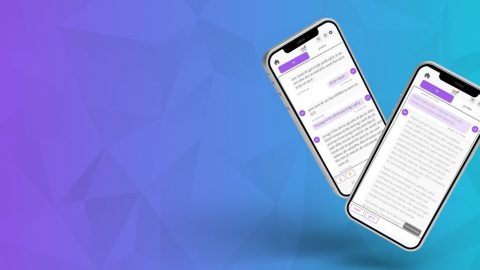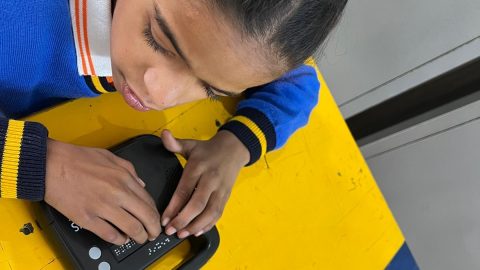Providing mental health assistance via text messages for young adults
In the US, the demand for mental health services exceeds the supply. Access to these services is especially difficult for younger, lower-income, rural, and minority groups. Many people who can’t access formal care are still interested in self-management tools. To help, Mental Health America (MHA), Northwestern University, University of Toronto, and Audacious Software created “Small Steps SMS”.
 “Small Steps SMS” is an 8-week text messaging program for self-managing mental health. Unlike apps, which most people stop using within 2 weeks, this SMS-based approach is easier to adopt, providing less friction to understanding the tech, and was used for an average of 38 days in a pilot with 5,000 participants. The program provides daily interactive text messages in support of mental health, and in the design process the team worked closely with young people experiencing depression and anxiety to understand the type of challenges they are facing, the skills they wish to learn, and how can text messages come to aid.
“Small Steps SMS” is an 8-week text messaging program for self-managing mental health. Unlike apps, which most people stop using within 2 weeks, this SMS-based approach is easier to adopt, providing less friction to understanding the tech, and was used for an average of 38 days in a pilot with 5,000 participants. The program provides daily interactive text messages in support of mental health, and in the design process the team worked closely with young people experiencing depression and anxiety to understand the type of challenges they are facing, the skills they wish to learn, and how can text messages come to aid.
From a user’s perspective, individuals can sign up for Small Steps SMS after completing various mental health self-screeners on Mental Health America’s (MHA) website. When people choose Small Steps SMS, they will answer a few additional questions and input their phone number. Subsequently, they will receive automated text messages for up to 8 weeks. These messages are designed to help individuals learn new skills, develop positive thinking patterns, and overcome challenges. Importantly, the program is not intended to replace human relationships. Instead, it serves as a tool to empower individuals to take charge of their own mental health. By trying out new strategies—such as practicing self-compassion, expressing gratitude, and establishing daily routines—participants can discover what works best for them. The program offers various ways for individuals to engage with it. Some prefer answering reflection questions, while others seek practical tips and suggestions. Additionally, some find solace in reading stories shared by fellow participants. Over time, the program adapts its messages based on individual preferences and responses.
Despite experiencing elevated mental health symptoms, adolescents encounter substantial obstacles in accessing formal care. These challenges arise from a scarcity of dedicated adolescent mental health services and the intricate process of understanding mental health and seeking support. The team discovered through various interactions and trials of the SMS program that adolescents grapple with unaddressed issues such as anxiety about growing up in an uncertain world, perceived mental health stigma from older generations, and mixed feelings about social media’s impact on mental health. Despite finding the program beneficial, they expressed a need for it to acknowledge these challenges and assist in resolving them.
From a technology perspective, the researchers can schedule messages and set system responses through a user interface, enabling a rich dialogue without custom software. The system’s architecture also supports machine learning integration for personalized content based on collected data. Specifically, reinforcement learning allows Small Steps SMS to adjust content delivery rate and dialogue timing.
The team aims to enhance the program by incorporating the learnings from their work with adolescents and Black and African American communities. In its pilot phase, Small Steps SMS proved to be user-friendly and effective in reducing depression symptoms, and MHA intends to make the program widely accessible to aid individuals in independently managing their mental health symptoms.








